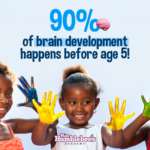
It may still be winter, but our eyes are on August. Why? These current months are critical for many caregivers because it’s time to start thinking about the next school year. Caregivers of young children who don’t currently have other kiddos in school, this time is particularly important for you as you choose what is best for your learners for next year. So let’s talk about preschool.
Is Preschool Important?
YES. I’m not going to even lead up to it. Yes, preschool is so important because it offers young learners opportunities that they may not otherwise experience prior to kindergarten. That does NOT mean that children will be unsuccessful in kindergarten and later years of school if they do not attend preschool, just that it has the potential to significantly help in the preparation.

Preschool helps kids work on skills that are educational, of course, but they also are able to exercise skills that are not solely for academic purposes. Students practice social and emotional development, numeracy and literacy skills, and usually many other subjects that directly apply to the academic side of school.
Preschool also helps engage and expand critical-thinking skills, social skills, verbal communication skills, social comfortability, and structure comfortability.
We as caregivers are probably used to hearing that the early years of a kid’s life are critical for learning and development. Why is that, though? Well, in around the first five years of a child’s life, a child can learn the most in the shortest time. Even though it might not always feel like it at home when we are trying to set a new boundary, a young child’s retention is truly incredible. Preschool can really set children up for continued academic success as they have countless opportunities for learning in a school setting.
As an extra bonus, preschool can drastically help young learners feel confident and ready for kindergarten instead of jittery and anxious.
Is Preschool Required?
Preschool is NOT a requirement in the United States. Each state has its own rules regarding the required age for children to begin attending school. You can find your state’s age requirement in the chart below:
| State | Age Requirement for Child to Start Attending School |
| Alabama | 6 |
| Alaska | 7 |
| Arizona | 6 |
| Arkansas | 5 |
| California | 6 |
| Colorado | 6 |
| Connecticut | 5 |
| Delaware | 5 |
| District of Columbia | 5 |
| Florida | 6 |
| Georgia | 6 |
| Hawaii | 5 |
| Idaho | 7 |
| Illinois | 6 |
| Indiana | 7 |
| Iowa | 6 |
| Kansas | 7 |
| Kentucky | 6 |
| Louisiana | 7 |
| Maine | 7 |
| Maryland | 5 |
| Massachusetts | 6 |
| Michigan | 6 |
| Minnesota | 7 |
| Mississippi | 6 |
| Missouri | 7 |
| Montana | 7 |
| Nebraska | 6 |
| Nevada | 7 |
| New Hampshire | 6 |
| New Jersey | 6 |
| New Mexico | 5 |
| New York | 6 |
| North Carolina | 7 |
| North Dakota | 7 |
| Ohio | 6 |
| Oklahoma | 5 |
| Oregon | 6 |
| Pennsylvania | 8 |
| Rhode Island | 5 |
| South Carolina | 5 |
| South Dakota | 6 |
| Tennessee | 6 |
| Texas | 6 |
| Utah | 6 |
| Vermont | 6 |
| Virginia | 5 |
| Washington | 8 |
| West Virginia | 6 |
| Wisconsin | 6 |
| Wyoming | 7 |
Is My Child Ready?
Some children start going to preschool as early as two years old, while other children start at three or four. I can’t begin to understand the individual needs of each child and each family, so this ultimately is a personal decision. There are some pieces of advice I can offer, though, in terms of child-readiness:
- Decent verbal skills: because students will be required to communicate with teachers and peers they might not typically encounter, some basic verbal skills can be really helpful prior to entering preschool.
- Following directions: it’s very useful for students to confidently follow one-to-two step instructions. Typically, one teacher will be responsible for more than one child, so the ability for each student to be able to listen and follow directions will help your learner’s comfort level in preschool.
- Potty-training: DON’T PANIC. I’m NOT here to say that all preschools require potty-training. I know first-hand that isn’t true. But some MIGHT require it for a certain age group, so as you do research, make sure you are aware of the potty-training expectations.
Where Do I Start?
Deciding to send a child to preschool can be tough for so many reasons. It impacts the entire family, and it’s definitely an emotional choice for everyone involved. Families need to feel like they have chosen the right fit for their child, and we as caregivers look for so much: safety, comfortability, good socialization, amazing security, nurturing faculty, student confidence and success, and preparation for kindergarten.

If you have decided that one of your kiddos is ready for preschool, there are a few helpful steps to take as you decide which preschool is right for you, your learner, and your family.
- Research schools in your area. Know what options are available to you in the proximity you’re willing to travel.
- Ask your circle. Talk with your family or friends that are in the area about schools with which they have experience. Any red flags to know about?
- Read reviews and ratings. What have other people said on social media about the school? Does the school have state or county ratings?
- Check the specifics. What options are available at the preschool? Is it a full-time only school? Are there half-day options? Can you choose the days and times? How much do the different options cost? Is food served?
What Should I Know?
One crucial thing to know about enrolling a child in preschool is that you need to think about it MONTHS in advance. Many of the best preschools have limited enrollment numbers, and sometimes priority is given to families currently involved with the school. That could mean that there are minimal new-family spots, and if you know which school you want, it helps to know far in advance when that enrollment window opens.
Apart from the important things already mentioned, there are a few more key questions you can ask the director of the preschool you’ve chosen or are visiting:
- What security measures are in place during school hours? This is a great opportunity to learn about drop-off and pick-up safety as well as the security of the building or outside areas while your students are attending preschool.
- What are the standards for hired teachers and staff? This question can help you understand the background and education levels of those who will be working directly with your learners.
- What is the classroom ratio? It’s always good to know the number of teachers to students.
- What are the discipline strategies? If your learner misbehaves, it can be helpful to understand how that behavior will be addressed. Will it match your strategies at home? Are you comfortable with the strategies the school has in place?
- What is the daily structure? Often teachers will provide this information at the beginning of a school year, but it can help to know this even beforehand. Maybe if it’s entirely different from what you currently do at home, you may consider restructuring your daily schedule to help your learner prepare. This is also a great opportunity to learn whether or not the school provides the kinds of activities and learning that fit your child’s learning.
- Are there any specific requirements? This will help you understand any expectations, like potty-training, that may exist.

Other Options
You may look at preschools in your area and think, Gosh! These are so expensive! Or maybe something like, I simply CANNOT make this work with our family’s schedule! Well, despite whatever reason out-of-home preschool may not seem like a doable option for you, you still have preschool options right from your home! If you’re reading this blog, you’re already closer than you think!
If you have chosen to do in-home preschool, Miss Humblebee’s Academy is the top resource to get a curriculum for preschool online. As stated on our website:
We have an award-winning program that is designed to be as fun and challenging as possible so that your child will be much more adept at succeeding in learning. The curriculum covers all subjects and material from preschool through kindergarten, should you decide to continue homeschooling beyond preschool.
misshumblebee.com
Preschool is SO important for students—but you CAN still get many of the benefits of preschool from your own home. The most important thing is to do what is right for you, your family, and your learners!






 Meet Miss Humblebee and Her Five Bug Friends: Where Every Child Learns & Belongs
Meet Miss Humblebee and Her Five Bug Friends: Where Every Child Learns & Belongs



